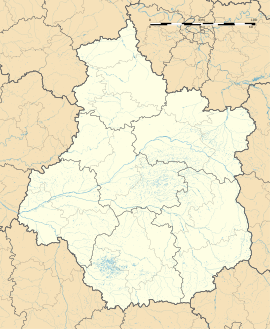Brinay (French pronunciation: [bʁinɛ]) is a commune in the Cher department in the Centre-Val de Loire region of France, consisting of a village and five hamlets by the banks of the river Cher about 8 kilometres (5.0 mi) southeast of Vierzon.
Brinay | |
|---|---|
| Coordinates: 47°10′42″N 2°07′43″E / 47.1783°N 2.1286°E | |
| Country | France |
| Region | Centre-Val de Loire |
| Department | Cher |
| Arrondissement | Vierzon |
| Canton | Mehun-sur-Yèvre |
| Intercommunality | CC Cœur de Berry |
| Government | |
| • Mayor (2020–2026) | Bernard Baucher[1] |
Area 1 | 29.48 km2 (11.38 sq mi) |
| Population (2021)[2] | 524 |
| • Density | 18/km2 (46/sq mi) |
| Time zone | UTC+01:00 (CET) |
| • Summer (DST) | UTC+02:00 (CEST) |
| INSEE/Postal code | 18036 /18120 |
| Elevation | 97–137 m (318–449 ft) (avg. 120 m or 390 ft) |
| 1 French Land Register data, which excludes lakes, ponds, glaciers > 1 km2 (0.386 sq mi or 247 acres) and river estuaries. | |
Population
edit| Year | Pop. | ±% |
|---|---|---|
| 1962 | 300 | — |
| 1968 | 318 | +6.0% |
| 1975 | 329 | +3.5% |
| 1982 | 452 | +37.4% |
| 1990 | 546 | +20.8% |
| 1999 | 467 | −14.5% |
| 2008 | 503 | +7.7% |
See also
editReferences
edit- ^ "Répertoire national des élus: les maires". data.gouv.fr, Plateforme ouverte des données publiques françaises (in French). 2 December 2020.
- ^ "Populations légales 2021" (in French). The National Institute of Statistics and Economic Studies. 28 December 2023.
Wikimedia Commons has media related to Brinay (Cher).


